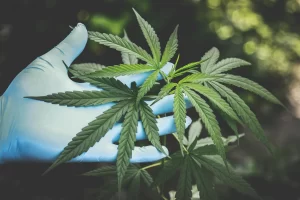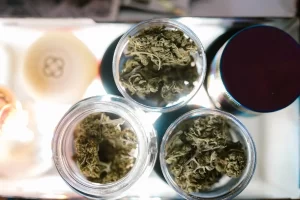 When the cannabis industry became legal in New Jersey four years ago, municipalities were given the option to opt out. A majority did at the time. Since sales began in April 2022, a few more municipalities have opted in but still it hovers at about 1/3 of the state hosting its 200 dispensaries. Seven of those municipalities are in Mercer County, including Hamilton, where Vision Cannabis recently gained approvals and is expected to open on Sloan Avenue. As we’ve seen the expansion roll out, is it working as had been described, or are some initial concerns bearing fruit?
When the cannabis industry became legal in New Jersey four years ago, municipalities were given the option to opt out. A majority did at the time. Since sales began in April 2022, a few more municipalities have opted in but still it hovers at about 1/3 of the state hosting its 200 dispensaries. Seven of those municipalities are in Mercer County, including Hamilton, where Vision Cannabis recently gained approvals and is expected to open on Sloan Avenue. As we’ve seen the expansion roll out, is it working as had been described, or are some initial concerns bearing fruit?
Today we share two perspectives: One from an insider of the cannabis industry who owns a dispensary and teaches others about the business. The other who spoke out against municipalities opting in. He has a PhD in neuropsychology and writes and speaks about alternative “natural highs.”
An Industry Insider’s Perspective on Prosperity
 In November 2020 New Jerseyans voted overwhelmingly to pass Public Question Number 1, legalizing adult use cannabis in the state. A few months later, the legislature passed the Cannabis Regulatory Enforcement and Marketplace Modernization Act, also known as the CREAMM Act, laying the framework for the industry.
In November 2020 New Jerseyans voted overwhelmingly to pass Public Question Number 1, legalizing adult use cannabis in the state. A few months later, the legislature passed the Cannabis Regulatory Enforcement and Marketplace Modernization Act, also known as the CREAMM Act, laying the framework for the industry.
The CREAMM Act gave municipalities the power to determine whether to allow cannabis businesses within their borders, and it gave them six months to enact ordinances, permitting or prohibiting the use. Nearly all of the 565 municipalities moved quickly to pass laws, with most towns opting out – and prohibiting the use all together. Many municipalities that did not approve the use within their borders (including some where the local constituents overwhelmingly voted in favor of Public Question Number 1) wanted to wait and see what happened in the towns that opted in, before enacting their own rules.
After a bit more than three years, here is what it looks like in general.
While many dispensaries are thriving, that is not always the case. Some, despite solid growth of the industry statewide, are already on their way out of business. So, what makes one store a success and another fail? Towns like West Milford, Atlantic City, and the Plainfields which opted in early with liberal granting of dispensary licensees have witnessed the proliferation of dispensaries. Driving along Route 22 in Union County, one passes multiple dispensaries with empty parking lots.
Other towns, that decided to allow fewer dispensaries, find most of those dispensaries are generally thriving. So, the first thing is simply supply and demand. Too many dispensaries in an area to share a finite customer base means not enough business to go around; the better ones survive. This attrition is good for the industry and the customer, and not unique to the cannabis industry.
There are, of course many things that differentiate a successful business from a bust, but we see here how municipal action can help make or break a cannabis business.
Municipalities like the ones above who granted lots of licenses did so, in part, because they believed that more tax dollars would flow if there were more dispensaries generating revenue. The CREAMM Act allows municipalities to impose up to 2% transfer tax on sales occurring within the municipality. However, we have seen that is not the case as more outlets do not always mean more sales (or tax revenues).
Tax revenues are only one of the things for municipalities to consider when considering whether to license business within their borders or not.
Both municipalities and legal cannabis businesses are struggling with unlicensed and unregulated stores that sell hemp derived products, including Delta-8. These products can produce a similar psychoactive effect as cannabis and most of the time there is little information about where the product came from and what ingredients might be in it. Furthermore, unlike licensed and highly regulated cannabis businesses that must adhere to strict advertising and labeling requirements under the law, many of the products in unregulated stores are packaged in a way to appeal to children, and the stores lack policies to ensure that customers are over at the age of 21. Making the issue more complicated – enforcement around illegal shops is largely left up to the local officials to enforce zoning laws, and some towns have few resources for this.
 With all of this said, over the past three years we have witnessed more municipalities choose to opt in – now with approximately one-third of all municipalities allowing some type of cannabis business. The towns that took this “wait and see” approach have the benefit of seeing the good and the bad to help guide their decisions.
With all of this said, over the past three years we have witnessed more municipalities choose to opt in – now with approximately one-third of all municipalities allowing some type of cannabis business. The towns that took this “wait and see” approach have the benefit of seeing the good and the bad to help guide their decisions.
Overwhelmingly, the track record of the dispensaries has been excellent. The fear of seedy shops has not materialized. Rather we find upscale, attractive, well managed storefronts. Products sold at a licensed dispensary must be accompanied by a Certificate of Analysis and must pass testing standards imposed by the Cannabis Regulatory Commission (“CRC”). Towns also see the reality of substantial tax revenue being generated.
There is some urgency for towns to make decisions about allowing cannabis sales.
The CRC, the body that licenses and regulates cannabis businesses, continues to issue licenses. At any time, the CRC could decide that there are enough businesses open to support the industry and could close, or limit licenses issued within the state. This has not happened yet, but municipalities that might still be on the fence about opting in, could see the opportunity pass them by.
Businesses already licensed and open worry about how many licenses is too many? Not only on the retail front, but in terms of amount of cannabis cultivated within the state. Will there comes a time in New Jersey when there is too much cannabis, that cannot be sold at a price that will support legal dispensaries? The CRC will factor this into their licensing plans and while the result is not known, it tilts towards fewer new licenses, and if not acted on, some really missed opportunities for towns who may wait too long to act.
Problems Explained, Perspective by a Mental Health Professional
 Four years in, I’m still not interested in more cannabis stores. On a recent outing to my favorite restaurant, I had two unpleasant experiences related to a new recreational cannabis dispensary that opened next door. As we parked and walked to the restaurant, my wife was nearly run over by a driver who eagerly made his way to the cannabis shop. I didn’t say anything, but when I got bumped by one of the shop’s advertising inflatables, a green “tube man” with flapping arms – I took matters into my own hands. I reached down, found the power button and shut it off. Fight the power! I told the restaurant owner, and he thanked me. He shared numerous examples of inconsiderate actions by the cannabis shop, including trying to hang a banner on restaurant property.
Four years in, I’m still not interested in more cannabis stores. On a recent outing to my favorite restaurant, I had two unpleasant experiences related to a new recreational cannabis dispensary that opened next door. As we parked and walked to the restaurant, my wife was nearly run over by a driver who eagerly made his way to the cannabis shop. I didn’t say anything, but when I got bumped by one of the shop’s advertising inflatables, a green “tube man” with flapping arms – I took matters into my own hands. I reached down, found the power button and shut it off. Fight the power! I told the restaurant owner, and he thanked me. He shared numerous examples of inconsiderate actions by the cannabis shop, including trying to hang a banner on restaurant property.
My experience outside that local dispensary was not just an isolated incident. It was a microcosm of what has been happening across New Jersey since cannabis was legalized in 2021. Recreational cannabis dispensaries pose potential safety risks for both customers and the general public, and their advertising practices are often aggressive and sometimes illegal.
A 2024 study by the Safe Leaf Society found that New Jersey’s legal weed products contained unsafe levels of yeast, mold and bacteria. NJ Advance Media reported that nearly 30% of the products tested contained harmful microbes exceeding legal limits. In addition to quality control problems, dispensaries are significantly more likely to be targets for robbery. They sell a high-value product that is easily sold on the still-thriving black market. Additionally, cannabis businesses often operate primarily in cash due to federal banking restrictions, as cannabis remains illegal at the federal level. To mitigate risk, dispensaries hire security guards and cover windows, but these measures only make them stand out even more.
It’s no surprise that legalization increased the availability of cannabis, but it also led to increased use among young adults and a rise in impaired driving. Researchers at the University of Illinois Chicago found that car crash fatalities significantly increased in more than half the states with legalized recreational cannabis markets. Overall, motor vehicle deaths associated with recreational cannabis markets increased by 10%. According to the study’s author, Samantha Marinello, Ph.D., “To see a 10 percent increase in motor vehicle accident deaths associated with recreational markets is concerning. Previous studies have found cannabis impairs driving ability and that driving while high is fairly common among regular cannabis users.” New Jersey is experiencing a similar trend, with law enforcement struggling to enforce DUI laws related to cannabis impairment.
Another troubling aspect of the recreational cannabis industry is its advertising. Annoying green tube men are only part of the problem. A 2024 study in the Journal of Cannabis Research evaluated compliance with advertising regulations on social media – specifically, restrictions on appealing to youth and making health claims. The analysis revealed a regular practice of non-compliance throughout the study period, with nearly a third of posts containing at least one violation. Additionally, one in ten posts either appealed to youth or made erroneous health claims. Social media platforms such as Instagram are popular for advertising cannabis companies, but the app has no way to distinguish between licensed or unlicensed shops. In many ways, social media is a free-for-all with enforcement being inconsistent at best.
 Despite these public health concerns, some politicians in New Jersey are seeking to expand the industry. A bill was recently introduced by state Senate President Nick Scutari (D-Union) that would speed up the approval process for medical cannabis facilities, allow them to transition to selling recreational cannabis sooner and municipalities would not be able to stop them, provided the dispensary has been operating without any violations for at least 180 days. In August 2021, New Jersey’s recreational cannabis law allowed towns to opt in or out of sales. Most opted out. Only a third of the state’s 564 municipalities decided to allow a cannabis business, but this new bill would essentially circumvent the approval process.
Despite these public health concerns, some politicians in New Jersey are seeking to expand the industry. A bill was recently introduced by state Senate President Nick Scutari (D-Union) that would speed up the approval process for medical cannabis facilities, allow them to transition to selling recreational cannabis sooner and municipalities would not be able to stop them, provided the dispensary has been operating without any violations for at least 180 days. In August 2021, New Jersey’s recreational cannabis law allowed towns to opt in or out of sales. Most opted out. Only a third of the state’s 564 municipalities decided to allow a cannabis business, but this new bill would essentially circumvent the approval process.
As we approach the four-year mark since the legalization of recreational cannabis in New Jersey, it’s important to reflect on the reality of the situation. Increased impaired driving, public health concerns and regulatory challenges were not part of the pitch for bringing recreational cannabis dispensaries to our communities. State officials must acknowledge the negative consequences and consider reforms before looking for ways to sidestep municipal approval of dispensaries. We should expand public education for youth, adults and seniors before expanding the market.

Sarah Trent is the Founder and CEO of Valley Wellness, a medical and adult use dispensary. She is also the Founder of Cannabis Certified, a one-of-a-kind cannabis education program for entry level jobs in the industry. Sarah is an attorney and former public defender. She now holds many leadership positions within the cannabis industry including, Co-Chair of the New Jersey State Bar Association’s Cannabis and Psychedelics Law Committee, member of the Board of Directors for the Somerset County Business Partnership, and member of the New Jersey Cannabis Trade Association Operations Committee. Sarah grew up in West Windsor, New Jersey and now lives in Somerset County.

Matt Bellace has a PhD in clinical neuropsychology. He’s the author of two books, a nationally recognized inspirational speaker and the host of the Better High Podcast.
